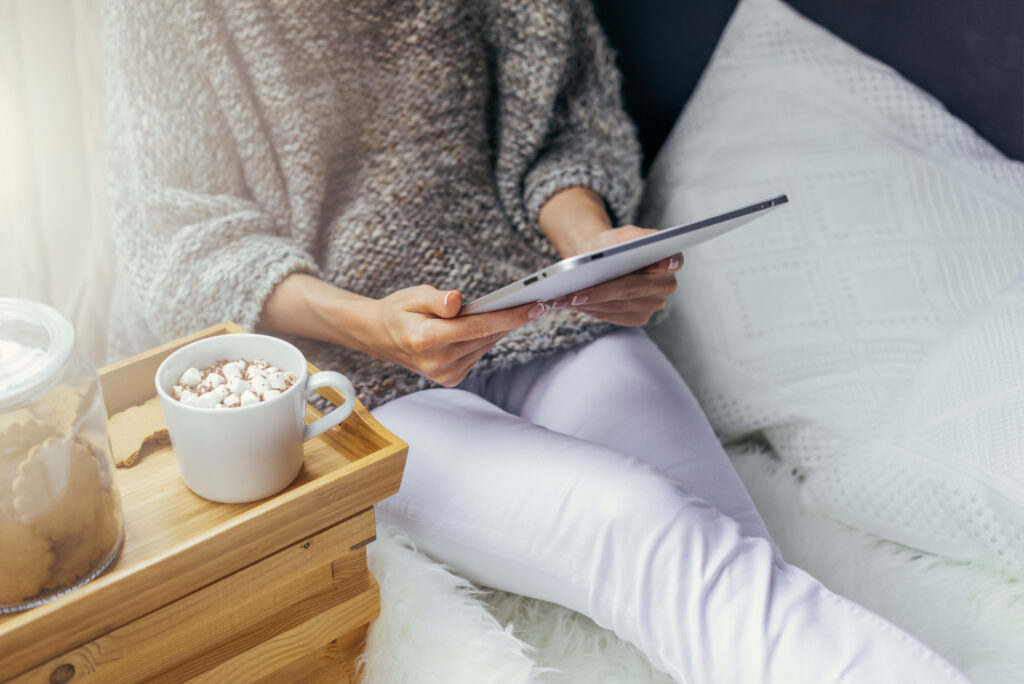New Study Finds That the Wavelength of Light, Not Color, Impacts Sleep

Electronic devices such as cell phones and tablets typically come with a “night mode” or “night shift” that filters out the blue light that can interfere with sleep. But night mode usually gives the screen a noticeable and sometimes bothersome yellow tint. In a new study, researchers found that a yellow hue is not necessary to obtain the benefits of night mode. They determined that the wavelength of the light, not its color, is the key driver of the potential impact on sleep. In the future, tech companies could manufacture devices with a night mode that blocks blue light without yellowing the screen.
Various parts of the eye play a role in vision. In the retina, rods and cones enable the perception of different colors. Special cells in the retina, called ganglion cells, are responsible for signaling to the brain that it’s daytime. Light with a short wavelength, such as blue light, stimulates these cells and suppresses the production of the sleep-promoting hormone melatonin.
In daily life, though, we often don’t see the color blue even when blue light is present. That’s because blue light mixes with light of other wavelengths. Mobile phones are a prime example because their screens appear white but give off blue light.
In the recently published study, researchers wanted to test whether the color of light we see from mobile devices impacts sleep. On separate visits to a sleep lab, participants were exposed to three distinct light sources that appeared as blue, yellow, or white. But each light source was set to provide the same amount of stimulation of retinal ganglion cells.

Researchers measured the time it took participants to fall asleep and their melatonin production. They also assessed daytime sleepiness, reaction time, and visual comfort.
Across all these measures, they found no differences based on the color of the light from the screen. Instead, the light’s wavelength and ability to activate ganglion cells influenced sleep and circadian timing.
While the researchers recommend filtering blue light with night mode, they argue that the benefits are obtainable without changing the screen color. Night mode does not currently offer this setting, but the researchers argue that such a configuration is technically possible.
This study provides strong evidence about the effects of light from mobile devices. Still, more research is required to understand how other factors, such as the timing and duration of light exposure, impact sleep.
In the meantime, it may be best to simply put electronics away in the lead-up to bedtime. Some research suggests that sleep quality is better when avoiding mobile devices rather than relying on night mode, and many experts recommend improving sleep hygiene with a relaxing and screen-free bedtime routine.
Got a hot tip? Pitch us your story idea, share your expertise with SleepFoundation.org, or let us know about your sleep experiences right here.
References
4 Sources
-
Blume, C., Cajochen, C., Schöllhorn, I., Slawik, H. C., & Spitschan, M. (2023). Effects of calibrated blue-yellow changes in light on the human circadian clock. Nature human behaviour, 10.1038/s41562-023-01791-7. Advance online publication.
https://www.nature.com/articles/s41562-023-01791-7 -
Yuda, E., Yoshida, Y., Ueda, N., & Hayano, J. (2020). Difference in autonomic nervous effect of blue light depending on the angle of incidence on the eye. BMC research notes, 13(1), 141.
https://bmcresnotes.biomedcentral.com/articles/10.1186/s13104-020-04988-5 -
Duraccio, K. M., Zaugg, K. K., Blackburn, R. C., & Jensen, C. D. (2021). Does iPhone night shift mitigate negative effects of smartphone use on sleep outcomes in emerging adults?. Sleep health, 7(4), 478–484.
https://pubmed.ncbi.nlm.nih.gov/33867308/ -
National Heart, Lung, and Blood Institute. (2011, August). Your guide to healthy sleep., Retrieved January 9, 2024, from
https://www.nhlbi.nih.gov/resources/your-guide-healthy-sleep












































































